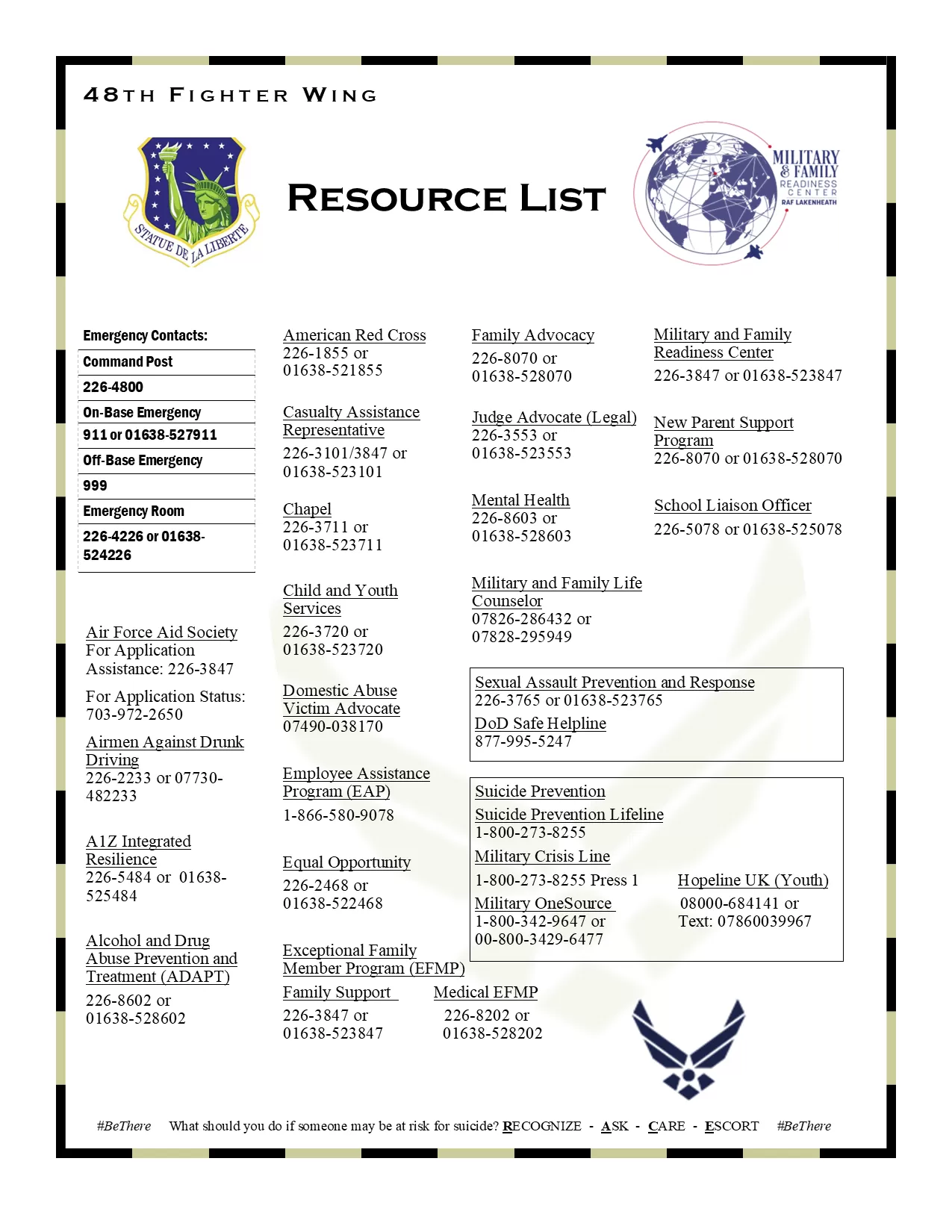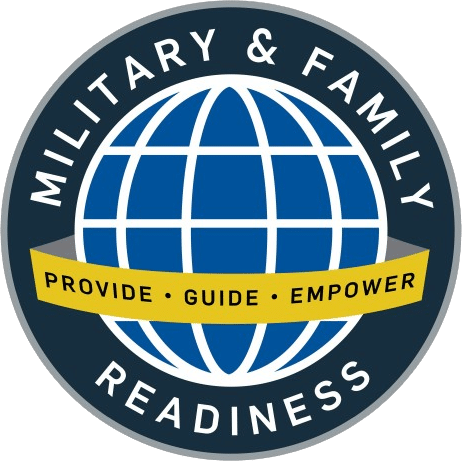Hours of Operation
Monday – Thursday : 7:30 AM – 5:00 PM
Friday : 7:30 AM – 2:00 PM
Saturday-Sunday : Closed
Holiday, Family & Goal Days : Closed
Hours
Military & Family Readiness Center
The 48th Fighter Wing Military and Family Readiness team supports Commanders with strengthening and sustaining operational readiness through assisting Airmen, Civilian Airmen, and their families with balancing the unique demands of military life. Click on the program or service you are needing more information on or keep scrolling to see how we can best support you and your family!
Air Force Families Forever
Air Force Families Forever (AFFF) provides support for surviving next-of-kin family members of deceased regular Air Force, U.S. Space Force, and Reserve Component Airmen who died in Active Duty, Inactive Duty for Training (IDT), or Annual Training (AT) status. Support is provided through Military and Family Readiness Centers at installations closest to where the survivor resides.
Next of Kin: widow (remarried or not), each parent (mother, father, stepmother, stepfather, father through adoption, mother through adoption, foster parents who stood in loco parentis), each child (natural, adopted, and step-children), and each sibling (brother, sister, half-brother, half-sister, step-sibling)
Information and Referral
- Engagement through targeted contact and incremental outreach
- Referral to eligible federal, state, and local resources
Remembrance and Connection
- Connection to installation and community support networks
- Recognition of deceased Airmen/Guardians
- Coordination with installation leadership
Installation Access
- Sponsorship for NOK through Defense Biometric Identification System (DBIDS)
- Introduction to installation approved Morale, Welfare, and Recreation (MWR) activities
Tragedy Assistance Program for Survivors (TAPS)
TAPS offers compassionate care to those grieveing the loss of a loved one who died while serving in the Armed Services or as a result of their service.
To find out more information about TAPS, pleas call the 24-hr helpline at 800.959.8277 or visit https://www.taps.org/
Casualty Assistance
The mission of the Casualty Assistance Program is to provide prompt and accurate reporting, compassionate notification, and thorough assistance.
The objectives of the Casualty Assistance Program are to:
- Provide prompt and accurate casualty reporting
- Provide dignified and humane casualty notifications to surviving family members
- Ensure efficient and compassionate follow-on casualty assistance to those designated to receive benefits and entitlements
Casualty Assistance Representatives are trained advisors who assist if service members are:
- Seriously ill or seriously injured
- Duty status – whereabouts unknown
- Missing
- Deceased
Support
The Casualty Assistance Program may provide support in a variety of ways, including:
- Assistance with arranging emergency transportation and travel
- Burial expenses
- Explaining benefits and entitlements
- Assisting with information and referral
- Coordinating with helping agencies for emotional and/or spiritual support
- Liaising with Mortuary and the Honor Guard
Eligibility
When a casualty notification is required, assistance may be provided to:
- Primary next of kin
- Secondary next of kin
- Individuals, other than primary or secondary next of kin, who are designated or eligible to receive benefits and/or entitlements
Tragedy Assistance Program for Survivors (TAPS)
TAPS offers compassionate care to those grieveing the loss of a loved one who died while serving in the Armed Services or as a result of their service.
To find out more information about TAPS, pleas call the 24-hr helpline at 800.959.8277 or visit https://www.taps.org/
Crisis Support
Crisis and disaster resources are intended to provide immediate assistance and referral to individuals and families.
Air Force Personnel Accountability and Assessment System (AFPAAS)
AFPAAS is a web-based program that delivers accountability data for personnel. During an emergency involving an evacuation or major mishap, full accounting of affected personnel will be initiated through AFPAAS.
When directed by leadership, Military and Family Readiness Center personnel are trained to assist with case management, as well as reporting Total Force Accountability through AFPAAS.
Emergency Family Assistance Center (EFAC)
In the event of a disaster or all-hazards event, the Military and Family Readiness Center is able to provide support through standing up an EFAC.
When activated, the EFAC may provide immediate disaster relief, information, and a variety of on-site services.
An EFAC will typically include on-site representatives for:
- Medical Services
- Casualty and Mortuary Affairs
- Religious and Pastoral Care
- Non-Medical Counseling
- Mental Health
- Housing or Temporary Lodging
- Transportation
- Legal Services
- Child and Youth Services
- Financial Services
- Public Affairs
- American Red Cross
Evacuation Operations
Evacuation operations may be initiated by the Department of Defense, in response to a situation that endangers the lives of personnel.
The Military and Family Readiness Center may act as a temporary safe haven where evacuees can stop for a short period of time while en route to a more permanent or final destination.
Employment Assistance
The RAF Lakenheath Employment Assistance Program provides education and training in order to assist service members, civilians, and family members with achieving short and long-term employment in both public and private sectors.
Employment Assistance may be provided in the following areas:
- Local Labor Information
- Resources for Service Members
- Transitioning Out of the Military
- Career Consultation
- Group Workshops
- Individual Appointments
Employment Resources
Workshops are offered for the following topics:
- Federal Employment and Navigating USAJobs
- Federal Resume Writing
- Resume 101 (Includes Civilian Resume and UK CV)
- Interview Insight
Appointments may be scheduled for the following areas of interest:
- Resume Review
- Mock Interviews
- LinkedIn Review
- Job Search Assistance
- Employment Questions and Tips
- USAJobs
- Negotiating Salary and Benefits
- Cover Letters
- LinkedIn and Effective Networking
The Military and Family Readiness Center is equipped with the following:
- Computers
- Printers
- Fax Machine
- Information: Job and Volunteer Opportunities
On-Base Employment Opportunities
- Non-Appropriated Funds (NAF) Positions
- Federal Employment
- Civil Service
- Army and Air Force Exchange Service (AAFES)
- Banks and Credit Unions
- Contract Positions
- Defense Commissary Agency (DeCA)
- Department of Defense Schools (DoDDS)
Off-Base Employment Opportunities
- Online Job Listings
- Jobcentre Plus and Staffing Agencies
- Education and Teaching Profession
- Nursing and Healthcare Jobs
Military Friendly Companies
Visa Vignette for Off-Base Employment
As part of the Status of Forces Agreement (SOFA), family members (military or civilian) must be command-sponsored with an Exemption Vignette (Visa Vignette); and no employment restrictions to work off base without a work permit.
A National Insurance Number (NIN), which is the equivalent to a Social Security Number (SSN), is also required to begin work.
For more information regarding a Visa Vignette, please contact the RAF Lakenheath Passport Office:
- Commercial: 01638.52.1210 | DSN: 226-1210
- e-mail: 48fss.passports@us.af.mil
Financial Readiness
Personal financial resources assist Airmen, Guardians, and family members with achieving and sustaining financial readiness through education, training, and individual support.
Financial Support
The Military and Family Readiness Center is equipped with certified personal financial counselors who may assist in a variety of ways.
Support may be provided through workshops, unit briefings, individual appointments, or tailored upon request. Topics may include:
- Individual Financial Counseling
- Moving Out of the Dorm
- Developing a Budget
- Investing
- Car Buying
- Home Buying
- Credit/Debt Management
- Retirement Planning
Mandatory Touchpoints
There are twelve (12) mandatory touchpoints when a service member must receive financial training, which includes:
- Accessions
- First Duty Station
- Thrift Savings Plan Vesting
- Continuation Pay
- Transition
- Pre/Post Deployment
- Marriage
- Divorce
- Birth of First Child (to include adoption)
- Disabling Sickness or Condition
- Subsequent Duty Station (to include grades E-4/O-3 and below)
- Promotion (to include grades E-5/O-4 and below)
Financial Resources
Download our Financial Resources guide for Airmen, Guardians, and Family Members.
Exceptional Family Member Program
The Exceptional Family member Program (EFMP) supports a continuum of care for Airmen, Guardians, and their families to promote readiness and improve the quality of life for family members with special needs. RAF Lakenheath EFMP assists with assignment coordination, family support information, and community resources and referrals. To receive full access to services, family members must be command-sponsored to their assigned installation. EFMP is a DoD-mandated enrollment program offered by all branches of the military. This, in part, assists with assigning active duty personnel to locations where the special needs of family members may best be met.
Family Support
EFMP Family Support Coordinators are located at the Military and Family Readiness Center and may assist in a variety of ways, including but not limited to:
- Non-medical support
- Education/information and referral
- Resource navigation (on and off installation)
- Needs assessments and services plans
- Unit training and outreach
- Community inclusion
- EFMP family events
- Relocation assistance/warm hand-offs
Medical
EFMP Medical is the process that documents and evaluates the medical and educational needs of family members. All families with one or more family member(s) with special needs must participate in the EFMP Medical review process before Permanent Change of Station (PCS) travel is authorized. EFMP enrollment may be initiated in several ways:
- Screening Process during Medical Appointments
- Referral from School or Key Community Personnel
- Screening during In or Out Assignment Processing
As soon as a special need is identified, active duty sponsors must contact the nearest Air Force Military Treatment Facility to speak with the EFMP Special Needs Coordinator; who will provide guidance and any necessary documents.
Enrollment in EFMP remains in effect until the medical or special education needs no longer meet criteria, until the Airman or Guardian separates from active duty, or until the family member is no longer a military dependent.
For additional information regarding EFMP Medical, please visit:
https://raflakenheath.tricare.mil/Patient-Resources/Exceptional-Family-Member-Program-EFMP
Respite Care
The Air Force recognizes that parents with children with special needs can benefit from some additional support. Respite child care is designed for active duty Airmen and Guardians who have children enrolled in EFMP and are diagnosed with moderate or severe special needs. At no cost to the family, eligibility requirements include:
- Active Duty or Reserve/Guard Member in an Active Duty Status
- Must be Q-Coded
- Verification of at least one child who has been identified as an Exceptional Family Member with a moderate or severe special need
For additional information regarding EFMP Respite Care, please visit:
https://www.dafchildandyouth.com/expanded-child-care
or contact the RAF Lakenheath Community Child Care Coordinator at:
Commercial: 01638.52.2170 | DSN: 314.226.2170
If you would like to be contacted by an EFMP Family Support Coordinator, please provide us with the following information:
Key Spouse Program
Key Spouses:
- Are selected and officially appointed in writing by the unit Commander
- Provide a copy of the signed appointment letter to the Military and Family Readiness Center
- Complete KSP initial training
- Attend continuing education training
The Military and Family Readiness Center provides support in a variety of ways, including:
- Scheduling initial KSP training
- Providing continuing education training opportunities
- Offering information and referral
- Maintaining a current roster of trained Key Spouses and Key Spouse Mentors
- Creating and maintaining unit organizational Key Spouse e-mail accounts
As part of Newcomers’ Orientation, the Military and Family Readiness Center hosts Spouse Orientation; which provides the opportunity for spouses to:
- Increase awareness of the Air Force/48th Fighter Wing mission
- Learn about customs and traditions
- Receive information about protocol and available resources
Key Spouses, and Key Spouse Mentors, are welcome and encouraged to attend Spouse Orientation.
To find out more information about the Key Spouse Program, and access helpful resources, please visit: https://www.afpc.af.mil/Airman-and-Family/Key-Spouse-Program/
Register and request an absentee ballot.
Complete the Federal Post Card Application (FCPA) by visiting FVAP.gov.
Print, sign, and send to your local election office by 1 August, or locate your state’s deadline by visiting FVAP.gov.
Tip: To identify your local election office, use your legal residence or the U.S. address where you last resided.
Once registered, your ballot should arrive by early October.
Complete your ballot and send it to your election office by the following deadlines:
- On a ship at sea: 5 October
- Outside the United States: 13 October
- Stateside: 27 October
After you send your ballot, you may confirm it was received by contacting your election office.
If your ballot doesn’t make it to you on time, you may complete the Federal Write-In Absentee Ballot (FWAB) by visiting FVAP.gov.
For voting related questions, please visit the FVAP website at: http://www.fvap.gov or contact the Air Force Total Force Service Center (TFSC) 24-hour voting assistance line at: 1.800.525.0102.
48th Fighter Wing Resource List

Upcoming Events



